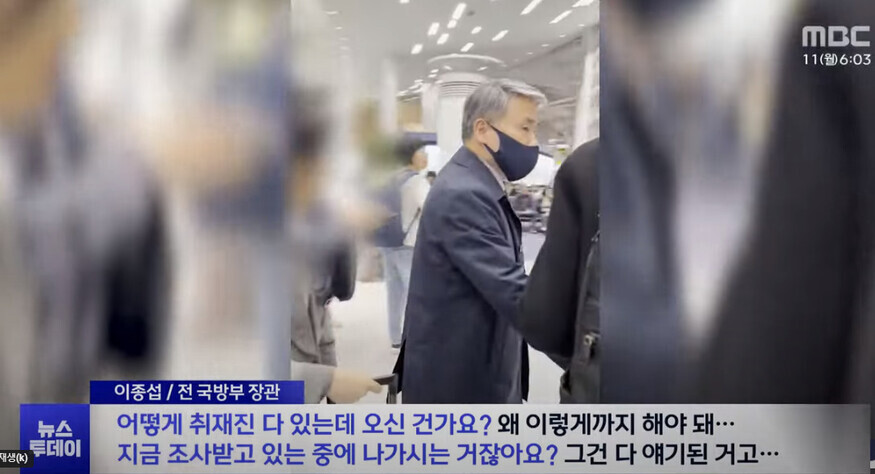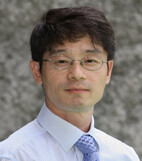hankyoreh
Links to other country sites 다른 나라 사이트 링크
[Column] Not a single person within the presidential office objected to former defense minister’s appointment as ambassador to Australia

When newly appointed South Korean ambassador Lee Jong-sup left for Australia on Mar. 10, he dodged reporters by entering the airport’s security area well ahead of his flight’s scheduled departure time.
At the gate, he ended up running into a reporter with the MBC network who had a ticket for the same flight. Flustered, Lee asked, “Why are you doing this?”
That’s the same question South Koreans are asking right now.
On July 30 of last year, Col. Park Jeong-hoon, leader of the Marines Corps investigation team, reported to Lee, who was the defense minister at the time, together with Marine Corps Commandant Kim Gye-hwan on plans for handling the investigation of a lance corporal’s death amid rescue efforts during widespread flooding.
The next day, Kim told Park to cancel everything. According to Park’s account, President Yoon Suk-yeol had become very angry at a meeting of senior presidential secretaries on July 31 and called up Lee.
The relevant parties have denied this. If it really was a fabrication on Park’s park, it would amount to an act of deception against the entire South Korean public — an audacious defamation of the president, complete with concrete details.
The major figures suspected of relaying orders from higher up at the time include four people in the Ministry of National Defense (MND) — Lee, Vice Minister Shin Beom-chul, military affairs advisor Park Jin-hee, and legal affairs officer Yu Jae-eun — and two in the presidential office, second deputy national security adviser Lim Jong-deuk and national defense secretary Lim Ki-hoon.
Here are the events that unfolded afterward.
#1. Resignations of four individuals between September and October: A new defense minister was appointed and the second deputy national security adviser and national defense secretary were replaced in September, while the vice defense minister resigned in October.
It is highly unusual for an entire national defense lineup to be switched out as it was here, with the minister and vice minister departing alongside the second deputy national security adviser (in charge of defense) and the presidential secretary for national defense. The only scenario where such a shuffle would make much sense would be a state of national emergency.
All of them had been in their position for a little over a year. Shin had always been planning to run in the general elections, but he stepped down much earlier than the Jan. 11 deadline for public officials to resign.
With so many defense officials exiting all at once, it became impossible to summon them to a parliamentary audit so that the National Assembly could properly question them on the details of the investigation.
#2. Two promotions in November: In regular appointments this month, military affairs adviser Park Jin-hee was promoted to major general and national defense secretary Lim Ki-hoon to lieutenant general.
It’s possible that they were promoted because they had completed the service requirements — but they were also the subjects of an investigation.
We find something similar in the case of prosecutor Son Jun-seong, who was indicted in May 2022 for inciting accusations. Son was then given a promotional transfer to serve as head of the Seoul High Prosecutors’ Office civil litigation department the following month. He was promoted again in September 2023 to the chief prosecutor level.
Another example is that of former Board of Audit and Inspection (BAI) secretary general Yoo Byung-ho, who was the subject of a search and seizure raid over “targeted audit” allegations but ended up being appointed as an audit committee member in February after completing his term as secretary general.
Another key suspect, 1st Marine Division commander Maj. Gen. Lim Seong-geun, was considered at the time for appointment in a key position as head of the Joint Chiefs of Staff posture inspection office, although he ended up declining and undergoing policy research.
#3. Two nominations in March: Lim Jong-deuk was recently nominated to run for the Yeongju/Yeongyang/Bonghwa district in North Gyeongsang Province.
This put him in competition with former lawmaker Kim Jae-won after redistricting shifted current lawmaker Park Hyeung-soo over to the nearby Uiseong/Cheongsong/Yeongdeok/Uljin district.
Shin Beom-cheol was also nominated to run for the Cheonan-A seat in South Chungcheong Province.
#4. Ambassadorial appointment in March: Of the four figures who resigned between September and October, three were nominated to run in the elections or left the country as an ambassador. The fourth is still working in the MND.
In the case of Australia, South Korea’s ambassadors are figures at the assistant minister level. Not including international organizations, there are four countries where the positions are ministerial-level (the US, China, Japan, and Russia). Countries where they are assistant minister level include the UK, Germany, France, India, and the European Union.
This means that Australia was abruptly upgraded to the same level as the US and China.
Also, ambassadors typically hold their posts for two to four years in consideration of relations with the country in question. Lee’s predecessor as ambassador to Australia took office in December 2022 and stepped down 14 months later.
Lee never had an appointment ceremony, departing for Australia four days after his appointment with a copy of his certificate in hand. In between, he underwent four hours of questioning by the Corruption Investigation Office for High-ranking Officials (CIO) and had an exit ban lifted by the Ministry of Justice (MOJ).
The presidential office claimed it was “unaware that an exit ban was in place.” Apparently, the MOJ “did not even tell” the CIO about it during the vetting process. Whichever MOJ official was responsible for this egregious dereliction of duty deserves severe disciplinary action.
Looking at the first through four examples listed above, we can only wonder when the Yoon administration became so kind and generous.
Also, the MOJ cited Lee’s “temporary submission of evidence [his cell phone]” as a factor in the decision to lift his exit ban. Lee did turn a phone over to the CIO — but it was reportedly purchased in August, shortly after the events of July 31.
This was an act of deception, if not mockery, against an investigative organization. What would happen if an ordinary person did the same?
In a Dec. 8 report entitled “PPP secretariat analysis of the election landscape,” the Chosun Ilbo said the party held leads for six out of 49 seats in the city of Seoul. On Dec. 26, Han Dong-hoon was named as the PPP’s interim leader.
With the Democratic Party subsequently becoming embroiled in a controversy over “pro-Lee Jae-myung nominations,” the situation was reversed, and many began predicting it would suffer a rout.
But the situation surrounding Lee Jong-sup’s appointment as ambassador to Australia has reawakened calls for voters to pass judgment on the current administration. This is a crucial moment where they are asking, “Why are you doing this?”
The PPP officials can’t speak out, but inside they are probably stewing. Did they look at the Democratic Party nomination issues and think, “This should be enough”? Or was it a case of “before it’s too late,” since losing the general election would mean they really couldn’t achieve anything?

Then the question becomes why the president’s circle stood around doing nothing about a situation that is potentially damaging to the administration.
By Kwon Tae-ho, editorial writer
Please direct questions or comments to [english@hani.co.kr]

Editorial・opinion
![[Column] Season 2 of special prosecutor probe may be coming to Korea soon [Column] Season 2 of special prosecutor probe may be coming to Korea soon](https://flexible.img.hani.co.kr/flexible/normal/500/300/imgdb/original/2024/0426/3317141030699447.jpg) [Column] Season 2 of special prosecutor probe may be coming to Korea soon
[Column] Season 2 of special prosecutor probe may be coming to Korea soon![[Column] Park Geun-hye déjà vu in Yoon Suk-yeol [Column] Park Geun-hye déjà vu in Yoon Suk-yeol](https://flexible.img.hani.co.kr/flexible/normal/500/300/imgdb/original/2024/0424/651713945113788.jpg) [Column] Park Geun-hye déjà vu in Yoon Suk-yeol
[Column] Park Geun-hye déjà vu in Yoon Suk-yeol- [Editorial] New weight of N. Korea’s nuclear threats makes dialogue all the more urgent
- [Guest essay] The real reason Korea’s new right wants to dub Rhee a founding father
- [Column] ‘Choson’: Is it time we start referring to N. Korea in its own terms?
- [Editorial] Japan’s rewriting of history with Korea has gone too far
- [Column] The president’s questionable capacity for dialogue
- [Column] Are chaebol firms just pizza pies for families to divvy up as they please?
- [Column] Has Korea, too, crossed the Rubicon on China?
- [Correspondent’s column] In Japan’s alliance with US, echoes of its past alliances with UK
Most viewed articles
- 1‘We must say no’: Seoul defense chief on Korean, USFK involvement in hypothetical Taiwan crisis
- 2Is Japan about to snatch control of Line messenger from Korea’s Naver?
- 3Division commander ordered troops to enter raging flood waters before Marine died, survivor says
- 4[Editorial] Korea’s surprise Q1 growth requires objective assessment, not blind fanfare
- 5[Column] Season 2 of special prosecutor probe may be coming to Korea soon
- 6[Special report- Part III] Curses, verbal abuse, and impossible quotas
- 7Flying “new right” flag, Korea’s Yoon Suk-yeol charges toward ideological rule
- 8[Guest essay] The real reason Korea’s new right wants to dub Rhee a founding father
- 9[Column] ‘Choson’: Is it time we start referring to N. Korea in its own terms?
- 10[Column] Park Geun-hye déjà vu in Yoon Suk-yeol